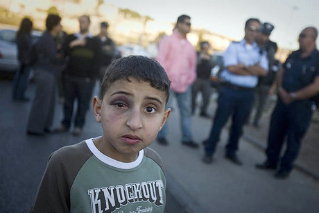 A child in Sheikh Jarrah (illustration). By Oren Ziv, Activestills
A child in Sheikh Jarrah (illustration). By Oren Ziv, Activestills“M.E from Silwan (East Jerusalem) was taken from his home at night, one day after his 12th birthday. He says that policemen employed harsh violence against him. A marked change in his behavior became immediately apparent following his arrest. On 17 January 2010, together with his parents, M.E. visited his family doctor, where he was diagnosed as suffering from insomnia, nightmares, nocturnal bed-wetting, excessive dependence on his parents, deterioration in school performance, violent behavior at home and outside, and stress-related signs including hair pulling, poor appetite, and disturbing thoughts. He was referred for neurological examination. On 22 February 2010, M.E. met with a psychiatrist, who determined that he required urgent psychological care to deal with the trauma he suffered.”
The World Conference for the Well-being of Children (1925) proclaimed June 1 to be International Children’s Day. This year, June 1 in Israel is also Jerusalem Day, marking the establishment of Israeli control over East Jerusalem in June 1967. On this day, the Association for Civil Rights in Israel (ACRI) is publishing the English translation of a report on police violations of the rights of Palestinian minors in East Jerusalem. The police treatment of many East Jerusalem minors violates an Israeli law established to protect the rights of minors during interrogation and detainment.
The Israeli Youth Law (Adjudication, Punishment and Methods of Treatment) establishes norms and guidelines for the arrest and investigation of minors. This law reflects the provisions of the International Convention on the Rights of the Child, as well as Israel’s Basic Law: Human Dignity and Liberty. Its underlying rationale is to “protect the rights of the minor, whether suspected or accused of committing a crime, taking into account his yet developing capacities and the overriding principle of protecting the welfare of the child; similarly, the aspiration underlying the law is that the juvenile’s delinquency may be reformed by means of appropriate treatment and punishment as detailed in the law.”
“In an article published on Ynet (an Israeli news website) in March 2011, it was reported that M., an 11 year old boy from Silwan (East Jerusalem), was arrested on suspicion of stone-throwing. After feeling ill during the interrogation, the child was released and according to his parents he later vomited up blood. At the hospital, it became clear that he had suffered a broken eye-socket. He told Ynet that he was tied and beaten in the stomach and on the head. M’s father told the reporter: ‘I am afraid because I can’t protect my son from the police. I was arrested in the past, but that’s not a reason to beat up my boy.'”
The Youth Law is intended to guide police treatment of all minors. According to data supplied by the Israel Police, over the past year more than 1,200 Palestinian minors from East Jerusalem have been investigated on suspicion of participating in throwing stones. According to the Youth Law, these minors should have enjoyed special protections during their arrest and detention and throughout the investigative process. However, in practice, many were denied their rights as minors during the process. Complaints filed by various minors in East Jerusalem point to a lack of police implementation of the Youth Law.
The police in East Jerusalem make use of the exceptions established by the Youth Law and turn them into the governing norms. As a result, minors in East Jerusalem do not enjoy the protections afforded to them by law. The routine use of the exceptions in the Youth Law in arresting and interrogating minors renders the law meaningless.
To download ACRI’s full report on police violations of the rights of Palestinian minors in East Jerusalem, click here.







